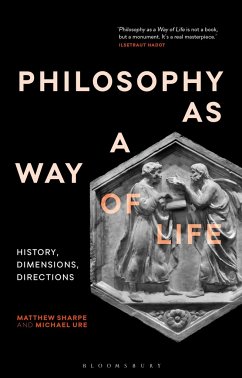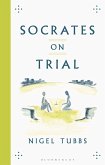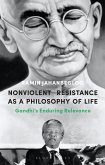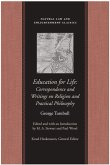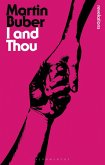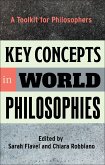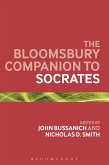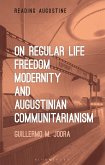Matthew Sharpe (Australia Deakin University), Michael Ure (Australia Monash University)
Philosophy as a Way of Life
History, Dimensions, Directions
Matthew Sharpe (Australia Deakin University), Michael Ure (Australia Monash University)
Philosophy as a Way of Life
History, Dimensions, Directions
- Broschiertes Buch
- Merkliste
- Auf die Merkliste
- Bewerten Bewerten
- Teilen
- Produkt teilen
- Produkterinnerung
- Produkterinnerung
In this first ever introduction to philosophy as a way of life in the Western tradition, Matthew Sharpe and Michael Ure take us through the history of the idea from Socrates and Plato, via the medievals, Renaissance and Enlightenment thinkers, to Schopenhauer and Nietzsche, Foucault and Hadot. They examine the kinds of practical exercises each thinker recommended to transform their philosophy into manners of living. Philosophy as a Way of Life also examines the recent resurgence of thinking about philosophy as a practical, lived reality and why this ancient tradition still has so much relevance and power in the contemporary world.…mehr
Andere Kunden interessierten sich auch für
![Socrates on Trial Socrates on Trial]() Nigel Tubbs (UK University of Winchester)Socrates on Trial33,99 €
Nigel Tubbs (UK University of Winchester)Socrates on Trial33,99 €![Nonviolent Resistance as a Philosophy of Life Nonviolent Resistance as a Philosophy of Life]() Professor Ramin Jahanbegloo (Jindal Global Law School and O.P. JinNonviolent Resistance as a Philosophy of Life32,99 €
Professor Ramin Jahanbegloo (Jindal Global Law School and O.P. JinNonviolent Resistance as a Philosophy of Life32,99 €![Education for Life Education for Life]() George TurnbullEducation for Life25,99 €
George TurnbullEducation for Life25,99 €![I and Thou I and Thou]() Martin BuberI and Thou18,99 €
Martin BuberI and Thou18,99 €![Key Concepts in World Philosophies Key Concepts in World Philosophies]() Key Concepts in World Philosophies39,99 €
Key Concepts in World Philosophies39,99 €![The Bloomsbury Companion to Socrates The Bloomsbury Companion to Socrates]() The Bloomsbury Companion to Socrates58,99 €
The Bloomsbury Companion to Socrates58,99 €![On Regular Life, Freedom, Modernity, and Augustinian Communitarianism On Regular Life, Freedom, Modernity, and Augustinian Communitarianism]() Professor Guillermo M. JodraOn Regular Life, Freedom, Modernity, and Augustinian Communitarianism42,99 €
Professor Guillermo M. JodraOn Regular Life, Freedom, Modernity, and Augustinian Communitarianism42,99 €-
-
-
In this first ever introduction to philosophy as a way of life in the Western tradition, Matthew Sharpe and Michael Ure take us through the history of the idea from Socrates and Plato, via the medievals, Renaissance and Enlightenment thinkers, to Schopenhauer and Nietzsche, Foucault and Hadot. They examine the kinds of practical exercises each thinker recommended to transform their philosophy into manners of living. Philosophy as a Way of Life also examines the recent resurgence of thinking about philosophy as a practical, lived reality and why this ancient tradition still has so much relevance and power in the contemporary world.
Hinweis: Dieser Artikel kann nur an eine deutsche Lieferadresse ausgeliefert werden.
Hinweis: Dieser Artikel kann nur an eine deutsche Lieferadresse ausgeliefert werden.
Produktdetails
- Produktdetails
- Re-inventing Philosophy as a Way of Life
- Verlag: Bloomsbury Publishing PLC
- Seitenzahl: 424
- Erscheinungstermin: 12. August 2021
- Englisch
- Abmessung: 211mm x 139mm x 27mm
- Gewicht: 516g
- ISBN-13: 9781350102149
- ISBN-10: 1350102148
- Artikelnr.: 60104709
- Herstellerkennzeichnung
- Libri GmbH
- Europaallee 1
- 36244 Bad Hersfeld
- gpsr@libri.de
- Re-inventing Philosophy as a Way of Life
- Verlag: Bloomsbury Publishing PLC
- Seitenzahl: 424
- Erscheinungstermin: 12. August 2021
- Englisch
- Abmessung: 211mm x 139mm x 27mm
- Gewicht: 516g
- ISBN-13: 9781350102149
- ISBN-10: 1350102148
- Artikelnr.: 60104709
- Herstellerkennzeichnung
- Libri GmbH
- Europaallee 1
- 36244 Bad Hersfeld
- gpsr@libri.de
Matthew Sharpe is Associate Professor of Philosophy, Deakin University, Australia. He is co-author of Zizek and Politics : a Critical Introduction (2010) and Understanding Psychoanalysis (2008) and author of Slavoj Zizek: a Little Piece of the Real (2004) and Camus, Philosophe: to Return to Our Beginnings (2016) Michael Ure is Senior Lecturer in Politics in the School of Political and Social Inquiry, Monash University, Australia. He is author of Nietzsche's Therapy: Self-Cultivation in the Middle Works (2008) and Nietzsche's 'The Gay Science' (2018) and co-editor of The Politics of Compassion (2014)
Introduction
Part 1: The Ancients
Ch. 1. Socrates and the Inception of Philosophy as a Way of Life
1.1 the atopia of Socrates
1.2 a founding exception
1.3 Socrates contra the Sophists
1.4 the elenchus as spiritual exercise
1.5 care of the psyche
1.6 the sage and the Socratic paradoxes
1.7 the Socratic legacy
Ch. 2. Epicureanism: Philosophy as a Divine Way of Life
2.1 Introduction
2.2 Epicureanism as way of life, therapy, and of writing
2.3 the turn inwards: against empty opinions, unnatural and unnecessary
desires
2.4 Epicurus' revaluation of happiness, pleasure and the good
2.5 the gods and the figure of the sage
2.6 the four-fold cure, and physics as spiritual exercise
2.7 spiritual exercises in the garden
2.7` Criticisms
Ch. 3. Stoicism: Philosophy as the Art of Living
3.1 Wisdom, knowledge of things human and divine, and an art of living
3.2 The Socratic lineage: dialectic, the emotions, and the sufficiency of
virtue
3.3 From Musonius Rufus to Seneca
3.4 Epictetus' Paranetic Discourses, and his Handbook
3.5 Marcus Aurelius' Meditations (Ta Eis Heauton)
Ch. 4. Platonisms as Ways of Life
4.1 Introduction: Platonisms
4.2 From Arcesilaus to Pyrrhonism: scepticism as a way life
4.3 Cicero: the philosopher as rhetorician and physician of the soul
4.4 Plotinus' philosophical mysticism
4.5 Boethius and the end of ancient philosophy
Part 2: medievals and early moderns
Ch. 5. Philosophy as a way of life in the middle ages
5.1 On Christianity as "philosophy"
5.2 Monastic philosophia, and the Christianisation of spiritual exercises
5.3 Scholasticism, the theoreticisation of philosophia, & the ascendancy of
dialectic
5.4 Counter-strains: from Abelard to Dante's Il Convivio
Ch. 6. The Renaissance of Philosophy as a Way of Life
6.1 Philosophy, the humanisti, and the ascendancy of rhetoric
6.2 Petrarch's Christian-Stoic medicines of the mind
6.3 Montaigne: The essayist as philosopher
6.4 Justus Lipsius' Neostoicism
Ch. 7. Cultura Animi in Early Modern Philosophy
7.1 The end of PWL (again)?
7.2 Francis Bacon: the Idols and the Georgics of the mind
7.3 On Descartes, Method and Meditations
Ch. 8. Figures of the philosophe in the French enlightenment
8.1 "The philosophe"
8.2 Voltaire and the view from Sirius
8.3 Diderot and his Seneca
Part 3: the moderns
Interlude: The Nineteenth Century Conflict between PWL and University
Philosophy
Ch. 9. Schopenhauer: Philosophy as the Way Out of Life
9.1 Introduction
9.2 Philosophy against sophistry (again)
9.3 Two cheers for Stoicism
9.4 The Saint versus the Sage
9.5 Schopenhauerian salvation
Ch. 10. Nietzsche: Philosophy as the Return to Life
10.1 Introduction
10.2 Nietzsche's metaphilosophical meditations
10.3 Nietzsche's philosophy as a spiritual exercise
10.4 Nietzsche's spiritual exercise: eternal recurrence
10.5 Conclusion
Ch. 11. Foucault'sReinvention of Philosophy as a Way of Life
11.1 Philosophical heroism: Foucault's Cynics
11.2 Foucault's reinvention of Philosophy as a Way of Life
11.3 Genealogy as spiritual exercise
11.4 Conclusion
Conclusion
1. PWL, today
2. History, declines and rebirths
3. Criticisms
4. PWL of the future?
Part 1: The Ancients
Ch. 1. Socrates and the Inception of Philosophy as a Way of Life
1.1 the atopia of Socrates
1.2 a founding exception
1.3 Socrates contra the Sophists
1.4 the elenchus as spiritual exercise
1.5 care of the psyche
1.6 the sage and the Socratic paradoxes
1.7 the Socratic legacy
Ch. 2. Epicureanism: Philosophy as a Divine Way of Life
2.1 Introduction
2.2 Epicureanism as way of life, therapy, and of writing
2.3 the turn inwards: against empty opinions, unnatural and unnecessary
desires
2.4 Epicurus' revaluation of happiness, pleasure and the good
2.5 the gods and the figure of the sage
2.6 the four-fold cure, and physics as spiritual exercise
2.7 spiritual exercises in the garden
2.7` Criticisms
Ch. 3. Stoicism: Philosophy as the Art of Living
3.1 Wisdom, knowledge of things human and divine, and an art of living
3.2 The Socratic lineage: dialectic, the emotions, and the sufficiency of
virtue
3.3 From Musonius Rufus to Seneca
3.4 Epictetus' Paranetic Discourses, and his Handbook
3.5 Marcus Aurelius' Meditations (Ta Eis Heauton)
Ch. 4. Platonisms as Ways of Life
4.1 Introduction: Platonisms
4.2 From Arcesilaus to Pyrrhonism: scepticism as a way life
4.3 Cicero: the philosopher as rhetorician and physician of the soul
4.4 Plotinus' philosophical mysticism
4.5 Boethius and the end of ancient philosophy
Part 2: medievals and early moderns
Ch. 5. Philosophy as a way of life in the middle ages
5.1 On Christianity as "philosophy"
5.2 Monastic philosophia, and the Christianisation of spiritual exercises
5.3 Scholasticism, the theoreticisation of philosophia, & the ascendancy of
dialectic
5.4 Counter-strains: from Abelard to Dante's Il Convivio
Ch. 6. The Renaissance of Philosophy as a Way of Life
6.1 Philosophy, the humanisti, and the ascendancy of rhetoric
6.2 Petrarch's Christian-Stoic medicines of the mind
6.3 Montaigne: The essayist as philosopher
6.4 Justus Lipsius' Neostoicism
Ch. 7. Cultura Animi in Early Modern Philosophy
7.1 The end of PWL (again)?
7.2 Francis Bacon: the Idols and the Georgics of the mind
7.3 On Descartes, Method and Meditations
Ch. 8. Figures of the philosophe in the French enlightenment
8.1 "The philosophe"
8.2 Voltaire and the view from Sirius
8.3 Diderot and his Seneca
Part 3: the moderns
Interlude: The Nineteenth Century Conflict between PWL and University
Philosophy
Ch. 9. Schopenhauer: Philosophy as the Way Out of Life
9.1 Introduction
9.2 Philosophy against sophistry (again)
9.3 Two cheers for Stoicism
9.4 The Saint versus the Sage
9.5 Schopenhauerian salvation
Ch. 10. Nietzsche: Philosophy as the Return to Life
10.1 Introduction
10.2 Nietzsche's metaphilosophical meditations
10.3 Nietzsche's philosophy as a spiritual exercise
10.4 Nietzsche's spiritual exercise: eternal recurrence
10.5 Conclusion
Ch. 11. Foucault'sReinvention of Philosophy as a Way of Life
11.1 Philosophical heroism: Foucault's Cynics
11.2 Foucault's reinvention of Philosophy as a Way of Life
11.3 Genealogy as spiritual exercise
11.4 Conclusion
Conclusion
1. PWL, today
2. History, declines and rebirths
3. Criticisms
4. PWL of the future?
Introduction
Part 1: The Ancients
Ch. 1. Socrates and the Inception of Philosophy as a Way of Life
1.1 the atopia of Socrates
1.2 a founding exception
1.3 Socrates contra the Sophists
1.4 the elenchus as spiritual exercise
1.5 care of the psyche
1.6 the sage and the Socratic paradoxes
1.7 the Socratic legacy
Ch. 2. Epicureanism: Philosophy as a Divine Way of Life
2.1 Introduction
2.2 Epicureanism as way of life, therapy, and of writing
2.3 the turn inwards: against empty opinions, unnatural and unnecessary
desires
2.4 Epicurus' revaluation of happiness, pleasure and the good
2.5 the gods and the figure of the sage
2.6 the four-fold cure, and physics as spiritual exercise
2.7 spiritual exercises in the garden
2.7` Criticisms
Ch. 3. Stoicism: Philosophy as the Art of Living
3.1 Wisdom, knowledge of things human and divine, and an art of living
3.2 The Socratic lineage: dialectic, the emotions, and the sufficiency of
virtue
3.3 From Musonius Rufus to Seneca
3.4 Epictetus' Paranetic Discourses, and his Handbook
3.5 Marcus Aurelius' Meditations (Ta Eis Heauton)
Ch. 4. Platonisms as Ways of Life
4.1 Introduction: Platonisms
4.2 From Arcesilaus to Pyrrhonism: scepticism as a way life
4.3 Cicero: the philosopher as rhetorician and physician of the soul
4.4 Plotinus' philosophical mysticism
4.5 Boethius and the end of ancient philosophy
Part 2: medievals and early moderns
Ch. 5. Philosophy as a way of life in the middle ages
5.1 On Christianity as "philosophy"
5.2 Monastic philosophia, and the Christianisation of spiritual exercises
5.3 Scholasticism, the theoreticisation of philosophia, & the ascendancy of
dialectic
5.4 Counter-strains: from Abelard to Dante's Il Convivio
Ch. 6. The Renaissance of Philosophy as a Way of Life
6.1 Philosophy, the humanisti, and the ascendancy of rhetoric
6.2 Petrarch's Christian-Stoic medicines of the mind
6.3 Montaigne: The essayist as philosopher
6.4 Justus Lipsius' Neostoicism
Ch. 7. Cultura Animi in Early Modern Philosophy
7.1 The end of PWL (again)?
7.2 Francis Bacon: the Idols and the Georgics of the mind
7.3 On Descartes, Method and Meditations
Ch. 8. Figures of the philosophe in the French enlightenment
8.1 "The philosophe"
8.2 Voltaire and the view from Sirius
8.3 Diderot and his Seneca
Part 3: the moderns
Interlude: The Nineteenth Century Conflict between PWL and University
Philosophy
Ch. 9. Schopenhauer: Philosophy as the Way Out of Life
9.1 Introduction
9.2 Philosophy against sophistry (again)
9.3 Two cheers for Stoicism
9.4 The Saint versus the Sage
9.5 Schopenhauerian salvation
Ch. 10. Nietzsche: Philosophy as the Return to Life
10.1 Introduction
10.2 Nietzsche's metaphilosophical meditations
10.3 Nietzsche's philosophy as a spiritual exercise
10.4 Nietzsche's spiritual exercise: eternal recurrence
10.5 Conclusion
Ch. 11. Foucault'sReinvention of Philosophy as a Way of Life
11.1 Philosophical heroism: Foucault's Cynics
11.2 Foucault's reinvention of Philosophy as a Way of Life
11.3 Genealogy as spiritual exercise
11.4 Conclusion
Conclusion
1. PWL, today
2. History, declines and rebirths
3. Criticisms
4. PWL of the future?
Part 1: The Ancients
Ch. 1. Socrates and the Inception of Philosophy as a Way of Life
1.1 the atopia of Socrates
1.2 a founding exception
1.3 Socrates contra the Sophists
1.4 the elenchus as spiritual exercise
1.5 care of the psyche
1.6 the sage and the Socratic paradoxes
1.7 the Socratic legacy
Ch. 2. Epicureanism: Philosophy as a Divine Way of Life
2.1 Introduction
2.2 Epicureanism as way of life, therapy, and of writing
2.3 the turn inwards: against empty opinions, unnatural and unnecessary
desires
2.4 Epicurus' revaluation of happiness, pleasure and the good
2.5 the gods and the figure of the sage
2.6 the four-fold cure, and physics as spiritual exercise
2.7 spiritual exercises in the garden
2.7` Criticisms
Ch. 3. Stoicism: Philosophy as the Art of Living
3.1 Wisdom, knowledge of things human and divine, and an art of living
3.2 The Socratic lineage: dialectic, the emotions, and the sufficiency of
virtue
3.3 From Musonius Rufus to Seneca
3.4 Epictetus' Paranetic Discourses, and his Handbook
3.5 Marcus Aurelius' Meditations (Ta Eis Heauton)
Ch. 4. Platonisms as Ways of Life
4.1 Introduction: Platonisms
4.2 From Arcesilaus to Pyrrhonism: scepticism as a way life
4.3 Cicero: the philosopher as rhetorician and physician of the soul
4.4 Plotinus' philosophical mysticism
4.5 Boethius and the end of ancient philosophy
Part 2: medievals and early moderns
Ch. 5. Philosophy as a way of life in the middle ages
5.1 On Christianity as "philosophy"
5.2 Monastic philosophia, and the Christianisation of spiritual exercises
5.3 Scholasticism, the theoreticisation of philosophia, & the ascendancy of
dialectic
5.4 Counter-strains: from Abelard to Dante's Il Convivio
Ch. 6. The Renaissance of Philosophy as a Way of Life
6.1 Philosophy, the humanisti, and the ascendancy of rhetoric
6.2 Petrarch's Christian-Stoic medicines of the mind
6.3 Montaigne: The essayist as philosopher
6.4 Justus Lipsius' Neostoicism
Ch. 7. Cultura Animi in Early Modern Philosophy
7.1 The end of PWL (again)?
7.2 Francis Bacon: the Idols and the Georgics of the mind
7.3 On Descartes, Method and Meditations
Ch. 8. Figures of the philosophe in the French enlightenment
8.1 "The philosophe"
8.2 Voltaire and the view from Sirius
8.3 Diderot and his Seneca
Part 3: the moderns
Interlude: The Nineteenth Century Conflict between PWL and University
Philosophy
Ch. 9. Schopenhauer: Philosophy as the Way Out of Life
9.1 Introduction
9.2 Philosophy against sophistry (again)
9.3 Two cheers for Stoicism
9.4 The Saint versus the Sage
9.5 Schopenhauerian salvation
Ch. 10. Nietzsche: Philosophy as the Return to Life
10.1 Introduction
10.2 Nietzsche's metaphilosophical meditations
10.3 Nietzsche's philosophy as a spiritual exercise
10.4 Nietzsche's spiritual exercise: eternal recurrence
10.5 Conclusion
Ch. 11. Foucault'sReinvention of Philosophy as a Way of Life
11.1 Philosophical heroism: Foucault's Cynics
11.2 Foucault's reinvention of Philosophy as a Way of Life
11.3 Genealogy as spiritual exercise
11.4 Conclusion
Conclusion
1. PWL, today
2. History, declines and rebirths
3. Criticisms
4. PWL of the future?

